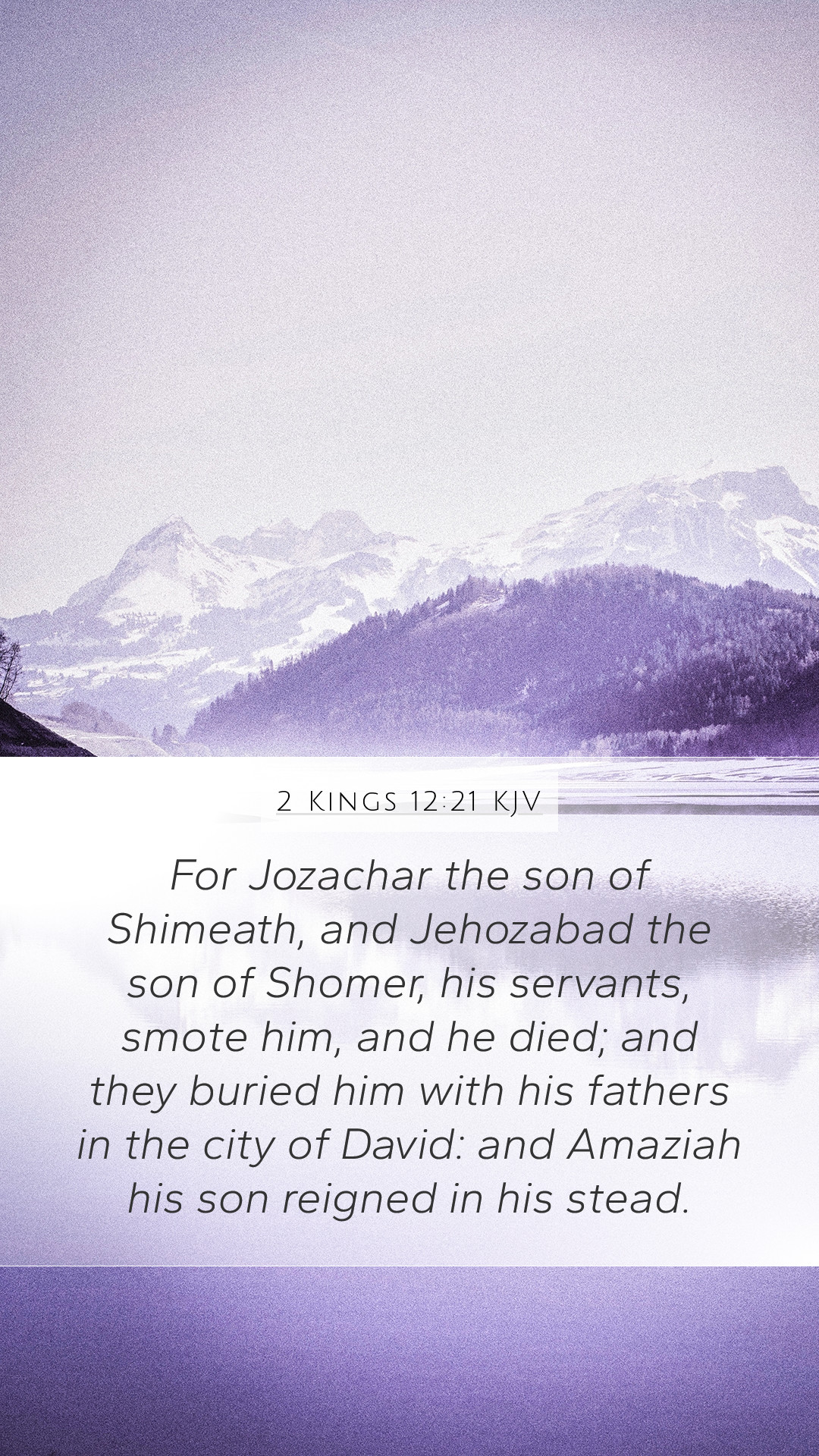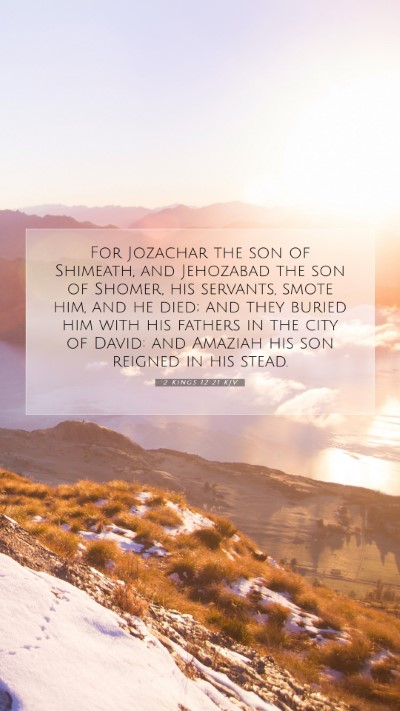Old Testament
Genesis Exodus Leviticus Numbers Deuteronomy Joshua Judges Ruth 1 Samuel 2 Samuel 1 Kings 2 Kings 1 Chronicles 2 Chronicles Ezra Nehemiah Esther Job Psalms Proverbs Ecclesiastes Song of Solomon Isaiah Jeremiah Lamentations Ezekiel Daniel Hosea Joel Amos Obadiah Jonah Micah Nahum Habakkuk Zephaniah Haggai Zechariah Malachi2 Kings 12:21 Meaning
What is the meaning of 2 Kings 12:21?
For Jozachar the son of Shimeath, and Jehozabad the son of Shomer, his servants, smote him, and he died; and they buried him with his fathers in the city of David: and Amaziah his son reigned in his stead.
2 Kings 12:21 Bible Verse Meaning
Understanding 2 Kings 12:21
2 Kings 12:21 states:
"For Jozachar the son of Shimeath, and Jehozabad the son of Shomer, his servants, smote him; and he died; and they buried him with his fathers in the city of David: and Amaziah his son reigned in his stead."
This verse marks a significant moment in the narrative of the kings of Israel and Judah. It encapsulates themes of treachery, judgment, and the fulfillment of divine prophecy. Here we provide an analysis drawing from various public domain commentaries.
Bible Verse Commentary
Matthew Henry's Commentary
Henry emphasizes the gravity of the actions taken by the servants of King Joash. They conspired against him, highlighting the perils of leadership and the reality of betrayal. Joash's reign, noted for initial reforms under Jehoiada, ended in tragedy as he strayed from the path of righteousness, turning to idolatry and neglect of God's temple. This verse serves as a somber reminder that divine protection is conditional upon faithfulness and obedience to God.
Albert Barnes' Commentary
Barnes interprets the assassination as a direct consequence of Joash's unfaithfulness to the covenant with God. Joash, once a champion of Yahwistic reforms, fell into grave sin, leading to his demise. His death is significant not only for its immediate political implications but also as a warning against forsaking God. The act of burial in "the city of David" suggests a continuation of legacy despite his failures, as he remains part of the lineage critical to Israel's history.
Adam Clarke's Commentary
Clarke elaborates on the sociopolitical context surrounding Joash's murder. The servants' rebellion showcases a struggle for power often seen in monarchic transitions. He notes the irony that Joash, who was once hidden to escape death, now faced a similar fate at the hands of his own people. Clarke also points out the prophetic undertones in this verse, paralleling the idea that leadership comes with accountability before God.
Key Themes and Insights
- Betrayal and Political Intrigue: This verse underscores the perils facing leaders and the ease of betrayal, recounting a cycle of disloyalty that often afflicts ruling figures.
- Faithfulness and Judgment: The narrative illustrates the importance of remaining faithful to God’s commandments as a protective measure for leaders and nations alike.
- Historical Significance: The death of Joash signifies a turning point in the kingdom's faithfulness to God, setting the stage for Amaziah's reign and subsequent events.
- Legacy and Identity: Despite his failures, being buried in the city of David maintains Joash’s identity within the lineage that God had established for His people.
Cross References
- 2 Kings 11:4-12 - The conspiracy to anoint Joash.
- 2 Kings 14:1-6 - The reign of Amaziah, son of Joash.
- Jeremiah 22:18 - A prophetic declaration regarding the fate of evil kings.
- 2 Chronicles 24:17-27 - Joash's idolatry and its consequences.
- Matthew 23:37 - God’s lament over the leaders who reject Him.
Application of 2 Kings 12:21
When exploring the meaning of this verse, it prompts readers to consider the ramifications of turning away from divine guidance. In our spiritual journeys, similar to the leaders in this passage, we are reminded of the necessity of remaining steadfast in our faith. This verse encourages deep reflection on how disobedience can lead to personal and communal destruction, inviting readers to actively engage with God through prayer, Scripture study, and community support.
Conclusion
2 Kings 12:21 serves as a poignant reminder for those studying the Bible to understand the weight of our actions and their repercussions. It encourages believers to seek both personal and communal fidelity to God's principles, ensuring that history not only informs but also transforms our lives.


